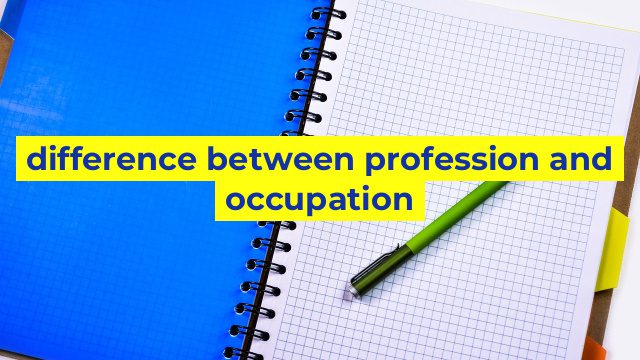The Difference Between Profession and Occupation
Profession and occupation may seem interchangeable, but they have different meanings. In today’s job market, it’s important to understand the difference and how it can affect your career.
What is an Occupation?
Occupation refers to a job or career that someone works in. It usually refers to a specific role or function, like a doctor, lawyer or teacher. Occupations can also describe jobs that require a specific set of skills, like a plumber or electrician.
What is a Profession?
A profession is different from occupation in that it refers to a career that requires specialized education, training, and certification. Professions are often governed by a professional body or association that sets standards for the practice of the profession. Examples of professions include accountants, engineers, architects, and nurses.
The Key Differences Between Profession and Occupation
The key differences between profession and occupation are education, training, certification, and regulation.
Education: While many occupations don’t require formal education beyond a high school diploma, professions require at least a bachelor’s degree and often require further education or certification.
Training: Occupations often require on-the-job training, while professions require specialized training to enter and maintain the profession.
Certification: Professions typically require certification or licensure to practice. This ensures that the professional has the necessary knowledge and skills to perform their job competently and ethically.
Regulation: Professions are often closely regulated, with standards for ethical conduct and practice. This provides protection for the public from unethical or incompetent professionals.
Why is it Important to Understand the Difference?
Understanding the difference between profession and occupation can help you make informed decisions about your career. If you’re interested in pursuing a profession, you’ll need to invest in the necessary education and training, and meet the certification requirements. If you’re satisfied with an occupation, you may be able to start working with less formal education or training.
Additionally, knowing the difference can help you understand the different levels of respect and compensation that may come with each. Professions are often more respected and better compensated than occupations, due to the higher education and certification requirements.
In conclusion, while profession and occupation may seem interchangeable, they are different terms with different meanings. Understanding the differences can help you make informed decisions about your career path and the education and training you need to succeed.
Table difference between profession and occupation
| Profession | Occupation |
|---|---|
| A profession is a type of occupation that requires a specialized skill or education. | An occupation refers to any type of job or career that generates regular income. |
| Examples of professions include doctors, lawyers, and engineers. | Examples of occupations include retail salespersons, food servers, and customer service representatives. |
| Professions often require advanced education or training, such as obtaining a graduate degree or undergoing specific certifications or licensing. | Occupations may require some form of training or education, but typically do not require advanced degrees or certifications. |
| Decisions regarding professions are often based on personal passions and interests, as well as the potential for high earnings. | Occupations are often chosen based on availability and accessibility of jobs, personal skills and experiences, and income potential. |
